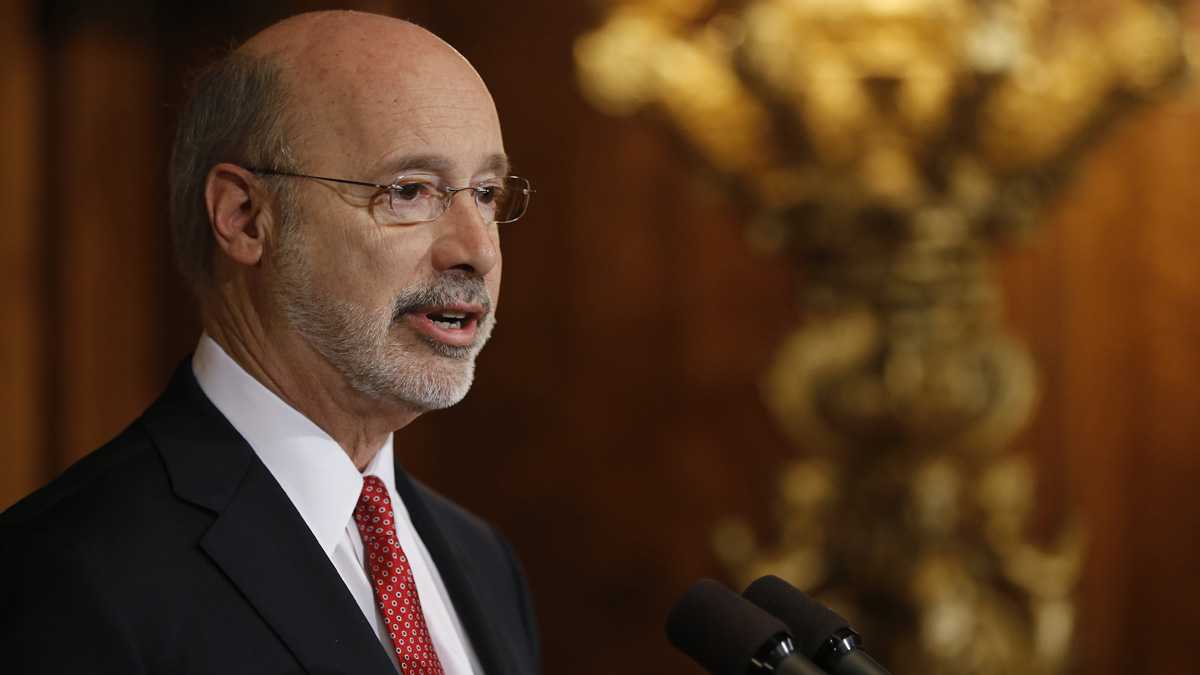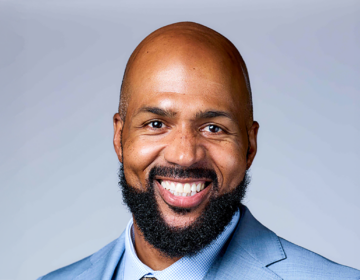Pa. budget talks could hit tougher sledding in election year
Listen
(Matt Rourke/AP Photo)
Pennsylvania Gov. Tom Wolf’s top priority in his first year in office has been to secure a historic funding boost for public education.
Six months past the state budget deadline, there still doesn’t seem to be a clear path to an agreement with the Republican-held House and Senate that would deliver on the governor’s pledge.
And the prospect may dim even more in 2016.
Right before Christmas, after close to half a year without state aid, schools and human service agencies across the state were getting desperate, and some school districts warned they might not be able to reopen after the holiday.
That prospect built a political pressure-cooker that seemed ready to force a compromise, giving Wolf a major victory — allocating a boost of more than $400 million for public schools.
But some key tenets of the larger “framework” plan were still shaky, and on the eve of the Christmas holiday, the prospect of resolution once again dissipated when House Republican leaders refused to bring it to a vote.
Left with few options, last week, Wolf signed a more modest budget that falls short of his hopes, but he used his line-item veto power in an attempt to compel leaders back to the negotiating table.
He slashed budget lines close to the interests of rural Republicans and decided to fund schools only through December.
But in off-the-record interviews, some Democratic lawmakers expressed fears that Wolf has weakened his hand by allowing some state aid to begin to flow.
Wolf spokesman Jeffrey Sheridan rejected that argument.
“There is no less urgency at this point,” said Sheridan. “Schools are getting emergency money being released to them so they can open their doors after the new year, but as of December 31st, they’re not going to have money flowing to them.”
Many lawmakers and onlookers from both sides of the political spectrum, though, said the road ahead for Wolf’s plan only gets steeper in 2016.
To get the big education funding boost he seeks, Wolf needs a solid bloc of Republicans in the legislature to agree to some sort of broad-based tax increase — such as sales or personal income.
Wolf and Democratic leaders say they have enough Republicans on their side to pass a levy. Republican leaders in the House doubt it.
Risky votes
If the votes are there, they’ll come from politicians willing to stick their necks out in an election year.
“I don’t know that I’d call it a threat. It’s just we’re telling them that, look, if you vote for this, there will be consequences for that vote,” said Leo Knepper, the executive director of Citizens Alliance of Pennsylvania.
The group CAP bankrolls campaigns for primary challengers who run against Republicans who vote for tax increases.
Many of the Republicans who seemed poised to vote for a budget that included Wolf’s big education funding increase got notes from Knepper’s group, reminding them that every member of the House will go before voters in 2016.
“We would also be using that vote to try and narrow down what our targets would be for the 2016 primary and general elections.”
The influential and independently wealthy state Sen. Scott Wagner, (R-York) was a major early donor to CAP. Wagner also recently sent letters to lawmakers urging them to reject tax increases.
Between its messaging, and the fact that some state aid has been released, CAP feels its interests now have the upper hand.
“The Republicans who were feeling the pressure to actually vote for the tax increases were feeling it largely because of local school districts, municipalities, local governments running out of money,” said Knepper. “And now that that leverage is no longer there, I see it being much more difficult to get the votes to do what the governor was talking about.”
State Rep. Kate Harper (R-Montgomery County), received a letter from CAP. She was one of 19 Republicans who crossed leadership to set up a vote for the $30.8 billion budget that Wolf seeks.
Harper says she personally would have voted against that spending bill, but helped maneuver it into position because the Wolf administration claimed it had the votes to pass.
In early December, Harper said she was willing to vote for a framework deal that would have expanded which items are eligible for the sales tax.
Recently she said could only support hiking the state’s tobacco tax. “I won’t vote for any broad-based tax increases,” she said.
State Rep. Martina White (R-Philadelphia), also crossed leadership to set up a vote on Wolf’s desired budget. But, in a recent interview, she also said she would have voted against it.
“The people in my district are working people, and it would have required a very large tax increase on them,” said White, a freshman representative from Northeast Philly.
State Rep. Mike Vereb (R-Montgomery County), said he would have OK’ed the $30.8 billion budget, but declined to say if there was a specific tax he would support to pay for it.
“I’m not going to get cornered into: ‘What would I vote for? What not would I vote for?’ What I would vote for is getting this thing done — not by any means at all,” said Vereb.
Pension question
Further complicating Wolf’s road ahead is that the Republican leaders in the Senate will only greenlight his education spending plan if there’s political will to pass a pension-reform bill that will reduce the share of market risk placed on the state and local school boards.
Future teachers and state workers would be enrolled in a “hybrid” retirement plan consisting of both a traditional state-guaranteed pension and a 401(k) style plan. That part of the plan guarantees contributions by the state but how much those funds will be worth at retirement fluctuates with the stock market.
Although there is little short-term savings in the bill, it would ease school districts’ retirement obligations in future generations — allowing the prospect of more resources being devoted to classrooms.
Wolf agreed to sign it as part of a larger compromise. The Senate passed the bill with bipartisan support. But the deal has fallen to pieces in the House.
Every Democrat voted against it.
And despite agreeing to it during the larger “framework” negotiations, House Majority Leader Dave Reed (R-Indiana County), fell well short of building enough support for it in his caucus. Sixty-six Republicans voted “no.”
Some rank-and-file House Republicans don’t believe it goes far enough to get the state out of the business of guaranteeing retirement benefits.
Some are willing to vote against it just to kill the larger budget deal and the tax increases that would come with it.
And some Republicans agree with Democrats who dislike the fact that it diminishes retirement security of workers.
Rep. White, who was elected last year with major labor support, says she voted against the pension bill because it contains a few provisions that affect current employees.
One would prevent existing employees from taking out a lump-sum pension payout at the full rate. Under the Senate-passed pension bill, lump-sum payouts would reflect actual market rates, not projections.
The Senate-passed bill also seeks to reduce pension “spiking” — raising pension payments by finding a high-paying job for the last year before retirement. The bill tries to dampen that by using a five-year earnings average to determine pensions rather than a three-year average.
“For me it was more about trying not to hurt the people who have worked really, really hard to earn their pensions,” said White.
Senate Majority Leader Jake Corman (R-Centre County), says he won’t compromise the bill any further. House democrats say that will be necessary for passage.
Here again, Wolf’s desired education boost hangs in the balance.
“Obviously in the House, if we’re going to pension reform, Democratic votes are required, and [Senate Republicans] ought to talk to us and have us help them write that bill if they want us to vote in significant numbers,” said House minority leader Frank Dermody, D-Allegheny.
To make matters slightly stickier for Democrats, they lost a voting member on Monday. Now-former State Rep. Cherelle Parker, D-Philadelphia, vacated her seat to join City Council.
“Well that makes it a little more difficult doesn’t it,” said Dermody.
Another Democrat, Thaddeus Kirkland from Delaware County is delaying his resignation from the House, even though he was just sworn in as mayor of Chester. He says he wants to keep voting in Harrisburg until a budget is finalized.
But despite all the doubts, the minority leader says he’s still optimistic that Wolf’s plan will succeed.
“Obviously they are going to be close votes,” he said. “We still feel that with our votes —and with what we can put together on the other side with responsible republicans — that we can get it passed.”
WHYY is your source for fact-based, in-depth journalism and information. As a nonprofit organization, we rely on financial support from readers like you. Please give today.





